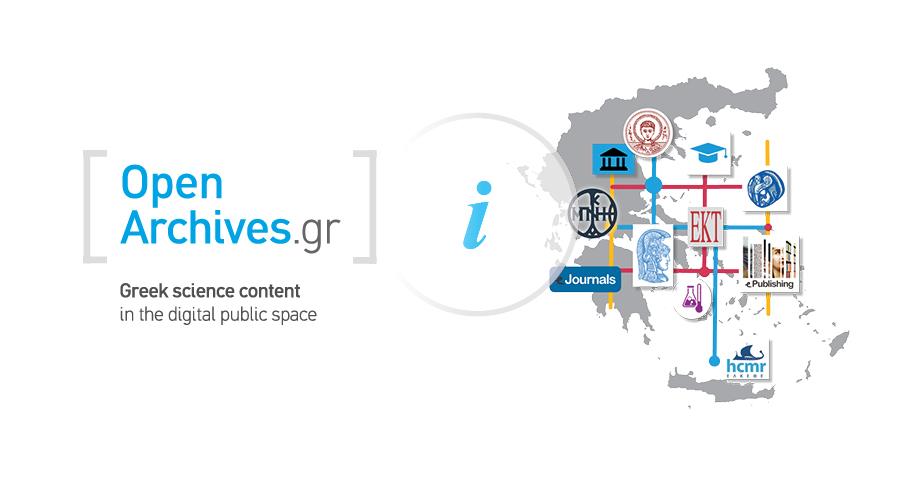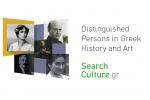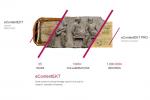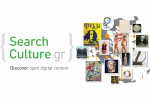
The optimal aggregation of digital content and the development of smart search methods are a constant challenge for OpenArchives.gr, the largest Greek portal for research and scientific content, developed by the National Documentation Centre (EKT). Guided by the optimal promotion of the content gathered together in the infrastructure, EKT implements actions of enrichment and classification of the available content, building on established vocabularies and thesaurii of terms.
With the additional aim of increasing the scientific content of OpenArchives.gr, EKT recently published the informative guide 'Interoperability specifications for the optimal publication of scientific digital resources and their inclusion in OpenArchives.gr'. In order to better understand the profile and needs of OpenArchives.gr users, EKT has also completed a relevant online user survey. The interesting findings of the research will be used in the design of the expansion and improvement of the portal.
About OpenArchives.gr
To date the user at OpenArchives.gr can search 770,000 items from 78 organisations in Greece and Cyprus such as universities, research centres, scientific companies, public libraries and institutions. Its contents are regularly updated so as to synchronise with the remote databases and repositories of their providers.
Looking through the collections of OpenArhives.gr, the user can find: grey literature (doctoral, postgraduate theses, educational material, etc.), articles in Open Access scientific journals as well as monographs, conference proceedings, scientific data sets and archives, covering a wide range of topics from the Natural Sciences, Technology, Social Sciences and Humanities. In this way, EKT allows the user to search across distributed databases through a single point of access.
The content of the collections covers a huge variety of scientific topics and presents great diversity. With the aim of optimally highlighting the content, as well as facilitating users in searching and discovering the material, EKT makes systematic efforts to enrich and classify it, using established vocabularies and thesaurii of terms.
New functional upgrades for more efficient search
EKT has enriched all the items with two new fields: 'EKT Types' and 'EKT Chronology'. The first includes references to the terms of a bilingual hierarchical glossary of types created by the EKT Information Scientists Team and which is linked to the Art & Architecture Thesaurus - AAT of the Getty Foundation and the semantic thesaurus DB of Wikipedia. Furthermore, EKT normalises the date and chronology of the collected items and homogenises dates that appear in the field “EKT Chronology”.
Capitalizing on the above functionalities, the user can now perform searches on all content and additionally filter the results based on the type of content and using time criteria. This is achieved by EKT scientific personnel in charge of the Vocabulary and Semantic Enrichment System Semantics.gr, which also includes an innovative and user friendly tool for mass semi-automatic semantic enrichment and content homogenisation. Moreover, users can search within the collections of one or more collections they have selected, thus enabling the sharing of results, e.g. in the repository of the school they are interested in.
Finally, semantic data enrichment work has been set in route, in order to improve the material classification and the content search process on the scientific fields they cover. This new functionality is expected to make use of artificial intelligence technologies in order to significantly improve user experience.
Understanding the public that visits OpenArchives.gr
With 20,000 visits per month, OpenArchives.gr is one of EKT's most popular infrastructures, demonstrating the need of the public for remote access to authoritative scientific content. But who is this audience, why do they visit OpenArchives? Are they satisfied?
In order to better understand the profile and needs of OpenArchives users, we 'ran' a short online survey last semester through a questionnaire that was integrated into the portal. The ultimate goal was to draw conclusions based on which the future expansion of the portal would be designed. The results of the survey, which involved 340 users, were extremely interesting
As expected, the vast majority come from academia and are professors, researchers and students looking for scientific articles, monographs and doctoral dissertations for their research or the elaboration of a thesis. A small percentage are unemployed, retired, entrepreneurs and employees conducting research out of personal or professional interest.
Out of the OpenArchives.gr’s regular users, 82% visit the aggregator at least 2-3 times a year, 48.7% of which visit it more than 4 times a year. 42% visit through a Google search, 26% because it was suggested to them, 14% found the platform through direct search and 13% through a post on another EKT based website.
The interest of the users is very much focused on topics related to the Humanities and Social Sciences and Arts, while the interest on Natural Sciences, Health Sciences, Veterinary Medicine and Agriculture is less than 15%. The vast majority (88%) are looking for something specific and only 11% visit the portal to navigate the content in general.
40% of the users, in addition to simple search, apply advanced search filters in their research. Users do not use help, but say they are quite satisfied with the search results (81%) and 98% of them said they would recommend it to others
The positive comments and congratulations exceeded our expectations 'extremely useful, it has untied the hands of researchers', 'for my work on Eugenios Voulgaris, Adamandios Korais and Rigas Velestinlis I have found invaluable materials that would be impossible to find here in faraway Chile', 'It has rich material and is very well informed'.
We analyse with interest the recommendations made for the improvement of the portal. The concept of the aggregator does not seem to be exactly understood by users, who to a large extent consider OpenArchives.gr to be a digital repository, so the most regular recommendation from users was that they would like to be able to isolate the research results who only have digital content and, if possible, have direct access to the digital content itself.
They also said that they would like access to more content, access to open datasets for data mining, to be able to see a researcher's publications and navigate by topics, as well as to know 'what is left out' of the available scientific collections. Finally, it was interesting that 100 people provided their contact details to participate in a more detailed survey, such as through a focus group.
Interoperability Specifications with OpenArchives.gr
As one of the main goals is the continuous increase of the scientific content that is included and becomes searchable through OpenArchives.gr, EKT recently published a guide 'Interoperability Specifications for the optimal publication of scientific digital resources and their inclusion in OpenArchives.gr'.
The guide is addressed to scientific and research bodies, who wish to include their content in OpenArchives. It includes the basic specifications for interoperability and documentation of digital content - metadata and digital files - that digital repositories must meet in order to allow the optimal availability of their collections in the storage infrastructure of OpenArchives.gr and make it compatible with others, such as European OpenAIRE infrastructure, as well as third-party systems and applications that exploit digital science content that generates new knowledge
The guide covers the most up-to-date best practices in documentation and interoperability such as unique identifiers, Interconnected Data and the use of Open Licences. Through the observance of uniform interoperability standards by the providers of scientific content, the documentation and distribution of the research results at a national level is achieved in a uniform way, a fact that increases the findability of the content and its international visibility, transparency in the scientific process, and the verifiability and validity of the research.
Data aggregation and interconnection
EKT has an integrated metadata aggregation infrastructure through which it collects the metadata of digital scientific resources from the websites and information infrastructures of the participating institutions, and implements processes of transformation, normalisation and semantic enrichment of the metadata. These are then published on the OpenArchives.gr portal, which offers users central access and advanced single search and navigation functions for the digital collections it hosts. The item pages of OpenArchives.gr display basic descriptive metadata and refer the user, through hyperlinks, to the corresponding item pages on the websites of the institutions, for access to more information, but also for viewing or uploading the digital files.
OpenArchives.gr provides two additional methods of publishing data: through Web API, which allows third-party applications to search and view items hosted in the Aggregator, and as Linked Data, thus contributing to the World Semantic Web. The presence of organisations and their collections at a single common site for view and search contributes to the promotion of their content, increases user access to their infrastructure and facilitates the dissemination of their work.
Towards a digital public space for scientific content
The expansion of the content and functions of OpenArchives.gr is part of EKT's institutional role but it is also part of its long-term activity related to the promotion of Open Science in the country in the context of European policies and support for the establishment of the European Open Science Cloud, through which the interconnection and interoperability of the research infrastructures of all the member states is undertaken, through the parallel formation of a culture of openness in research and the strengthening of the digital skills of researchers.
Implementing the vision for Open Science, and through the development of certain emblematic infrastructures, such as the National Archive of PhD Theses, the National Union Catalogue of Scientific Journals and the aggregators of scientific and cultural content OpenArchives.gr and SearchCulture.gr respectively, EKT, in line with the objectives of the Ministry of Digital Governance, its supervising body, aims to create a Digital Public Space where all national digital cultural and scientific content is available with the least possible restrictions to be used for the production of new knowledge from research, education and training. community.
The upgrade and expansion of OpenArchives.gr with new functionalities, is financed by the 'National Research Information and Technology System: Digital Content Aggregation, Documentation and Dissemination Infrastructure ensuring interoperability, long-term preservation and open access' Act, of the 'Public Sector Reform' national program which will be completed by July 2023.











